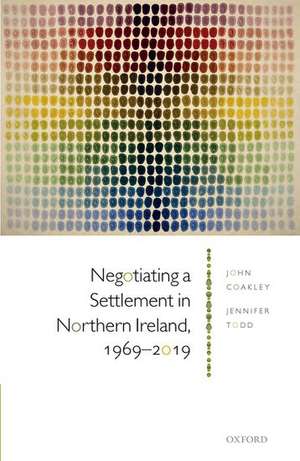Negotiating a Settlement in Northern Ireland, 1969-2019
Autor John Coakley, Jennifer Todden Limba Engleză Hardback – 30 ian 2020
| Toate formatele și edițiile | Preț | Express |
|---|---|---|
| Paperback (1) | 296.45 lei 10-17 zile | +79.61 lei 6-12 zile |
| OUP OXFORD – 27 apr 2023 | 296.45 lei 10-17 zile | +79.61 lei 6-12 zile |
| Hardback (1) | 826.89 lei 10-17 zile | |
| OUP OXFORD – 30 ian 2020 | 826.89 lei 10-17 zile |
Preț: 826.89 lei
Preț vechi: 1097.21 lei
-25% Nou
Puncte Express: 1240
Preț estimativ în valută:
158.23€ • 169.20$ • 131.93£
158.23€ • 169.20$ • 131.93£
Carte disponibilă
Livrare economică 17-24 martie
Preluare comenzi: 021 569.72.76
Specificații
ISBN-13: 9780198841388
ISBN-10: 0198841388
Pagini: 618
Dimensiuni: 159 x 231 x 37 mm
Greutate: 1.04 kg
Editura: OUP OXFORD
Colecția OUP Oxford
Locul publicării:Oxford, United Kingdom
ISBN-10: 0198841388
Pagini: 618
Dimensiuni: 159 x 231 x 37 mm
Greutate: 1.04 kg
Editura: OUP OXFORD
Colecția OUP Oxford
Locul publicării:Oxford, United Kingdom
Notă biografică
John Coakley, MRIA, is Professor of Politics at Queen's University Belfast, and Fellow of the Geary Institute for Public Policy at University College Dublin. Recent publications include Nationalism, Ethnicity and the State: Making and Breaking Nations (Sage, 2012), Reforming Political Institutions: Ireland in Comparative Perspective (IPA, 2013), Breaking Patterns of Conflict: Britain, Ireland and the Northern Ireland Question (co-edited, Routledge, 2015), Non-Territorial Autonomy in Divided Societies: Comparative Perspectives (edited, Routledge, 2017) and Politics in the Republic of Ireland (co-edited, 6th ed., Routledge, 2018).Jennifer Todd, MRIA is a Fellow of the Geary Institute for Public Policy at University College Dublin. She has been Fernand Braudel visiting Fellow at the European University Institute (2016) and is presently Fellow of the Political Studies Association of Ireland. She is co-author of the classic Dynamics of Conflict in Northern Ireland (Cambridge 1996), and recent publications include Identity Change after Conflict: Ethnicity, Boundaries and Belonging in the Two Irelands (Palgrave 2018), and jointly edited volumes on Ethnicity and Religion (Routledge, 2011); Breaking Pattens of Conflict (Routledge 2015).
Recenzii
A valuable, timely, and important book. Based on first-hand sources, the volume rightly stresses the long-term complexity of an extraordinary process.
This remarkable book combines historical archive, candid political interviews, and insightful scholarly analysis. Having had the foresight to gather recollections of those on all sides of Northern Ireland's long peace process in the wake of the 1998 Agreement, Coakley and Todd now bring this rich resource to deepen understanding of such negotiations and, indeed, of a painstakingly-crafted peace.
Coakley and Todd have delivered a first-class volume, a very impressive piece of work measured against any standard, coming out at a time when British-Irish relations, and the Northern Ireland institutions, are in a profound crisis because of Brexit.
This is a wonderfully rich and insightful study of repeated efforts by the British and Irish governments to bring an end to violent conflict in Northern Ireland. It is both an original work of political analysis and a treasure trove of primary materials. No scholar can write in the future about the role of the two governments in peace-making in Northern Ireland without reference to this book.
This remarkable book combines historical archive, candid political interviews, and insightful scholarly analysis. Having had the foresight to gather recollections of those on all sides of Northern Ireland's long peace process in the wake of the 1998 Agreement, Coakley and Todd now bring this rich resource to deepen understanding of such negotiations and, indeed, of a painstakingly-crafted peace.
Coakley and Todd have delivered a first-class volume, a very impressive piece of work measured against any standard, coming out at a time when British-Irish relations, and the Northern Ireland institutions, are in a profound crisis because of Brexit.
This is a wonderfully rich and insightful study of repeated efforts by the British and Irish governments to bring an end to violent conflict in Northern Ireland. It is both an original work of political analysis and a treasure trove of primary materials. No scholar can write in the future about the role of the two governments in peace-making in Northern Ireland without reference to this book.
